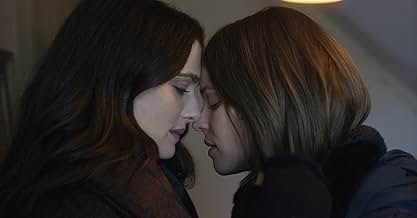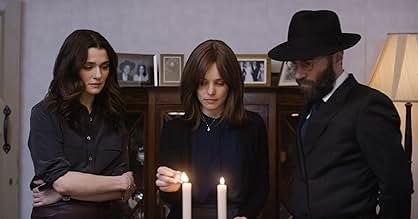Eine Frau kehrt zu ihrer orthodoxen jüdischen Gemeinde zurück, der sie wegen ihrer Anziehungskraft auf eine Jugendfreundin aus dem Weg gegangen ist. Bald nach ihrer Rückkehr werden ihre Leid... Alles lesenEine Frau kehrt zu ihrer orthodoxen jüdischen Gemeinde zurück, der sie wegen ihrer Anziehungskraft auf eine Jugendfreundin aus dem Weg gegangen ist. Bald nach ihrer Rückkehr werden ihre Leidenschaften neu entfacht, während sie die Grenzen des Glaubens und der Sexualität erkunden.Eine Frau kehrt zu ihrer orthodoxen jüdischen Gemeinde zurück, der sie wegen ihrer Anziehungskraft auf eine Jugendfreundin aus dem Weg gegangen ist. Bald nach ihrer Rückkehr werden ihre Leidenschaften neu entfacht, während sie die Grenzen des Glaubens und der Sexualität erkunden.
- Regie
- Drehbuch
- Hauptbesetzung
- Auszeichnungen
- 5 Gewinne & 36 Nominierungen insgesamt
Empfohlene Bewertungen
With Ronit's return, old sentiments are dredged up in a manner that upends the lives of all three in a community that simply has not developed tools for dealing with the full spectrum of matters involving private life, nature and choice that have in recent years become so normalized that we hardly lend them so much weight.
As each of the three struggle to cope with their issues, it becomes clear that there is a void in place of a guide in the doctrine of the community and that there is no one right way to cope with outlying struggles.
The directing of the picture and the portrayal of the three main characters is stellar. Aside from two seven-candle menorahs (which have no place in a Jewish home), this picture stands out as perhaps the most authentic portrayal of the ultra-Orthodox Jewish community in motion picture history.
The editing left much to be desired-scenes are awkwardly edited where you can see it's a different take of the same scene. Many of the edits simply appeared ham-handed and amateur.
Continuity also seems an issue; the progress of the story is chunked out, like skipping around chapters in a book. The screenplay lacks the dialog which would convey the depth of the story and it's characters.
The actors are quite good but not able to fill all the missing bits of good filmmaking. The score was musically fine but seems to have been written for a different movie. The pacing too, is slow and awkward like much of this film.
The Rachels handled what little they had to work with well. The sex scene was interesting and respectfully shot but again, the editing sucked all the life out of this love story.
Though I think this film was a missed opportunity, the potential for a well-written and directed sequel could fix what didn't work in this outing.
I really wanted to like it but kinda didn't.
The film opens with Rav Kruschka (Anton Lesser) abruptly dying in the midst of a service. In New York, his estranged daughter Ronit (Rachel Weisz) gets a call informing her of his death, and she returns home, heading to the house of Dovid (a superb Alessandro Nivola), her childhood friend, and Kruska's protégé. Although the community isn't especially happy to see her back, Dovid offers her a spare room. She accepts and is stunned to learn he is married to Esti (Rachel McAdams), another childhood friend. Over the next few days as the community prepare for Krushka's levaya (funeral), it becomes clear that Ronit and Esti were once more than friends, and the more time they spend in one another's company, the more their suppressed feelings come to the surface.
Thematically, Disobedience is far more concerned with the clash of views that results from Ronit's return than it is with condemning the beliefs of the community per se. When she first arrives at Dovid's house, she instinctively reaches out to hug him, forgetting about negiah (the forbidding of physical contact between men and women not related by blood, or married), and he immediately, although not unkindly, recoils. Later, there is an exceptionally awkward (but very funny) Shabbat meal, where Ronit seems to take great delight in being as outrageous as possible, riling up the assembled guests with her progressive worldview. This kind of ideological conflict, however, is also found within the characters themselves. Esti, for example, is torn between her desire for Ronit on the one hand, and her commitment to Dovid on the other. For her part, Ronit too internalises discord; although she has been estranged from him for many years, she is genuinely hurt to learn just how completely Krushka had divorced himself of her memory, seen most clearly when his obituary refers to him as "sadly childless".
Tellingly, during the Shabbat dinner, Dovid tries to play peacekeeper, whilst a couple of cutaways to Esti show her smiling to herself as Ronit burrows under the skin of those present. This kind of delicate touch on Lelio's part can be seen throughout the film, with numerous wordless gestures allowing the actors to convey backstory in lieu of exposition. For example, after Ronit arrives, although Dovid recoils when she tries to hug him, and although when she tries to light up a cigarette in his kitchen, he asks her to smoke in the garden, he accompanies her outside, shielding the flame from the wind in a gesture both kind and intimate.
On paper, the story might lend itself to a condemnation of the kind of social suffocation and emotional repression that can result from fundamentalism. Instead, however, the film spends time building a respectful, if not idealised, picture of the community's beliefs and practices. A key part of this respect is Dovid himself, an inherently decent and honourable man. In a less nuanced film, Dovid would be a fire-and-brimstone obstacle to Ronit and Esti's happiness, a Roger Chillingworth-type. Instead he is presented as someone who, like Esti, faces a difficult choice - that between his communal position and his faith on the one hand, and his genuine love of Esti and affection for Ronit on the other; his lifelong devotion to the Tanakh conflicting with modern day sensibilities. Indeed, perhaps Dovid's most salient characteristic is internal conflict. This is manifested aesthetically in a scene where he is addressing the synagogue. Lelio films the scene in such a tight close-up, that every time Nivola moves even slightly off his mark, he goes out of focus. It's a brilliant example of content generating form, and is typical of Lelio's directorial lightness of touch.
However, for all that, the film never lets you forget that this is a community of negiah, where married women must wear a sheitel wig in public, and where the genders are strictly divided at religious services. As Ronit and Esti discuss their sexuality, Esti points out that she and Dovid have sex every Friday night, "as is expected", and that the reason she was married to Dovid in the first place was that Krushka hoped "marriage would cure" her, a concept not far from homosexual conversion therapy. In this sense, although respectful of the community, the film does challenge some of the tenets of their belief system, particularly its myopic sexism.
Obviously, a major theme is sexuality. Much has been made of the sex scene between Ronit and Esti, with some critics accusing it of being little more than titillation at best, a graphic example of the male gaze at worst. However, this is to completely miss the point of the scene in relation to the whole. There are actually two sex scenes in the film; one between Ronit and Esti, and the other between Esti and Dovid. And although they couldn't be more different, they also couldn't exist without one another, as the abandonment, lust, and sense of pressure being released when Esti is with Ronit contrasts sharply with the detached, formulaic, and passionless scene with Dovid; the two scenes explicitly comment on one another. The scene between Ronit and Esti is the physical manifestation of the characters' long-repressed desire. It's a wholly justified narrative moment, and a necessary beat for the two characters. It's not an aside or a piece of voyeuristic male fantasy, it's the centre of the whole film. Together, the two scenes represent Esti's binary choice - an unbridled and sexually fulfilling, but unstable relationship with Ronit, or a dutiful and dull, but respectful and secure relationship with Dovid.
If I had one major criticism, it would be that although Lelio's direction is extremely subtle, some of his and Lenkiewicz's writing choices are spectacularly on the nose. The opening sermon is a good example - a religious diatribe whose subject is mankind's freedom to choose, the concomitant ability to disobey, and the notion that freedom is impossible without sacrifice, in a film about these very same issues. Another example is that Dovid and his yeshiva students are discussing the one book of the Tanakh dealing with sexuality rather than spirituality, the Song of Songs, whilst Esti's secondary school students are studying adultery in Othello. The worst example of this, however, is found when Ronit and Esti go to Krushka's house and Ronit turns on the radio, which just so happens to be playing The Cure's "Lovesong", a song which perfectly encapsulates their situation ("Whenever I'm alone with you/You make me feel like I am home again"). Not exactly subtle.
These issues aside though, this is an excellently crafted film. Once again examining female desire, issues of patriarchal oppression, and profound self-doubt, Lelio delivers a mature and considered meditation on the conflict between faith and sexuality. Eschewing black and white criticism of secular isolationism, Lelio respects the milieu too much to cast it as the villain. Instead, there is an elegance to the way in which he depicts it. Equal parts sensual and spiritual, the lethargic pace and absence of any narrative fireworks will probably alienate some, especially those expecting a pseudo-porn movie, but for the rest of us, this is thoughtful and provocative cinema in the best sense of the term.
Rachel Weisz and Rachel McAdams do a great job playing the two childhood friends (Ronit and Esti) who meet again years later, only to discover that their feelings for each other haven't changed. Alessandro Nivola plays the young rabbi husband (Dovid) of Rachel McAdams character (Esti), and portrays him beautifully.
I encourage you to see it. I doubt that you'll regret it.
Wusstest du schon
- WissenswertesThroughout the movie Esti Kuperman (Rachel McAdams) is shown wearing a wig. This wig is called a sheitel and is worn by some Orthodox Jewish married women in order to conform with the requirement of Jewish law to cover their hair.
- PatzerIn the scene where there are prayers in the house of mourning ("Shiva") the men and women are seen as intermingling. However, in a very orthodox Shiva service there would be complete separation of the genders - indeed, in a small house, such as the one depicted, they would be in separate rooms.
- Zitate
Ronit Krushka: Esti, do you think I should go back early?
Esti Kuperman: No... no. No, I don't think you should leave at all.
- VerbindungenFeatured in WatchMojo: Top 10 Amazing Movies You Missed This Spring (2018)
- SoundtracksThe Last Beat
Written by Matthew Herbert
Performed by Matthew Herbert (as Herbert)
Published by Soundslike Music
All rights administered by Bucks Music Group Limited
Courtesy of Accidental Records
(c) 2001 Accidental
Top-Auswahl
- How long is Disobedience?Powered by Alexa
Details
- Erscheinungsdatum
- Herkunftsländer
- Offizielle Standorte
- Sprachen
- Auch bekannt als
- Desobediencia
- Drehorte
- Produktionsfirmen
- Weitere beteiligte Unternehmen bei IMDbPro anzeigen
Box Office
- Budget
- 6.000.000 $ (geschätzt)
- Bruttoertrag in den USA und Kanada
- 3.498.782 $
- Eröffnungswochenende in den USA und in Kanada
- 237.393 $
- 29. Apr. 2018
- Weltweiter Bruttoertrag
- 8.003.180 $
- Laufzeit
- 1 Std. 54 Min.(114 min)
- Farbe
- Seitenverhältnis
- 2.35 : 1







































